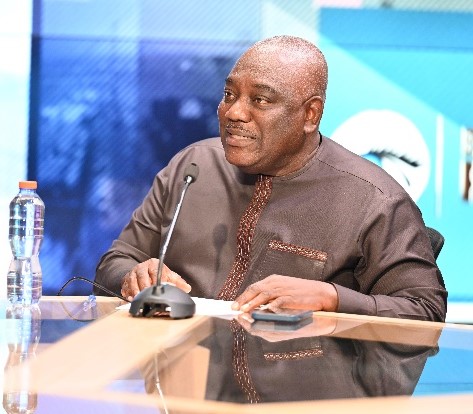By Laudia Sawer
Tema, April 19, GNA – Mr Gerald Agbettor, Chief Revenue Officer and Officer in Charge of Transit at the Customs Division of the Ghana Revenue Authority (GRA), has revealed that Ghana’s transit cargo increased between January and March.
Mr Agbettor said the transit trade for the first quarter of the year increased by 136,000 metric tonnes, contrary to public assertions that Ghana was losing its transit trade to neighbouring ports in Togo and Côte d’Ivoire.
He revealed that during the period, a total of 444,000,000 metric tonnes of transit cargo have passed through Ghana’s ports, compared to the 308,000,000 metric tonnes recorded during the same period in 2023.
Speaking on a Ghana Ports and Harbours Authority (GPHA) media forum, he said the data for customs declaration showed growth in the volume of transit trade in the country.
He explained that people have that perception because they see transhipment to Benin and Togo on the data manifest, indicating that “I saw transhipment to Benin and transhipment to Togo, and it became alarming; but the fact that it is transhipment on the manifest to Togo and Benin does not mean we are losing transit trade to them.”
The Chief Revenue Officer in charge of transit revealed that diversions of transit cargo in Ghana were at a low rate, stating, however, that security must be tightened at the various ports and transit terminals to facilitate fair trade.
“It is not really rampant, but it does not mean security should be relaxed; it should rather be tightened,” he said, noting that a meeting was recently held with stakeholders to gather data from them to help authorities serve them best.
He commended the GPHA for saving the Customs division of GRA GH¢90 million through the curbing of the rate of diversion at the port, adding that Ghana Link also played an instrumental role by providing dedicated monitoring devices on the house-to-house containers that move from the transit terminals to the transit parks.
Mr Eric Adiamah, a council member of the Ghana Institute of Freight Forwarders (GIFF), who was also on the forum, agreed that transit trade in Ghana was thriving well.
Mr Adiamah noted that the Port of Tema is the most preferred port along the West African coast by many landlocked countries, adding, however, that the country was losing some volume of transit to neighbouring countries due to regulations and the high cost of doing transit business despite the quality services such as safety and security that the Port provided.

He said that even though he does not have access to the data, on the ground, what they know is that Ghana is losing some volumes to neighbouring countries like Lomé, even though Tema Port is ahead in security and quality of service compared to the Togo port.
Mr Adiamah said the regulations governing transit trade are sufficient to control the diversion of transit cargo at the ports and encouraged the GRA’s Customs division to bolster its operational collaborations with freight forwarders to discourage them from participating in transit diversion.
“If the rules provided by the books are followed and monitored by customs and all the authorities, the rules as they stand now, are enough to do the business. The new things they are bringing up will not improve anything; they will not stop diversion; they will only worry people who do legitimate business,” he added.
GNA